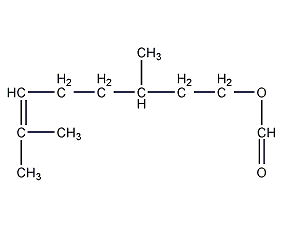
Structural formula
| Business number | 02SE |
|---|---|
| Molecular formula | C11H20O2 |
| Molecular weight | 184.28 |
| label |
None yet |
Numbering system
CAS number:105-85-1
MDL number:MFCD00021050
EINECS number:203-338-9
RTECS number:RH3480000
BRN number:None
PubChem number:24900999
Physical property data
1. Properties: colorless oily liquid. It has a strong rose and melon-like aroma and a fruity sweetness.
2. Density (g/mL, 25℃): 0.91058
3. Relative vapor density (g/mL, air=1): Undetermined
4. Melting point (ºC): Undetermined
5. Boiling point (ºC, normal pressure): 235
6. Boiling point (ºC, mmHg): Undetermined
7. Refractive index: 1.4511
8. Flash point (ºC): 93
9. Specific rotation (º): Undetermined
10. Autoignition point or ignition temperature (ºC): Not determined
11. Vapor pressure (mmHg, 20ºC): Not determined
12. Saturated vapor pressure (kPa, 25ºC) : Undetermined
13. Heat of combustion (KJ/mol): Undetermined
14. Critical temperature (ºC): Undetermined
15. Critical pressure (KPa): Undetermined
16. Log value of oil-water (octanol/water) partition coefficient: Undetermined
17. Explosion upper limit (%, V/V): Undetermined Determined
18. Lower explosion limit (%, V/V): Undetermined
19. Solubility: Insoluble in water. Dissolve in 80% ethanol at 1:(2-3).
Toxicological data
1. Skin/eye irritation: Standard Dresser test: human skin contact, 20mg/48 HREACTION SEVERITY, slight reaction; Standard Dresser test: rabbit skin contact, 500mg/24H; 2. Acute toxicity: rat oral LD50 :8400mg/kg;
Ecological data
None yet
Molecular structure data
1. Molar refractive index: 54.80
2. Molar volume (cm3/mol): 207.5
3. Isotonic specific volume (90.2K ): 479.1
4. Surface tension (dyne/cm): 28.3
5. Dielectric constant:
6. Dipole moment (10-24cm3):
7. Polarizability: 21.72
Compute chemical data
1. Reference value for hydrophobic parameter calculation (XlogP): 3.8
2. Number of hydrogen bond donors: 0
3. Number of hydrogen bond acceptors: 2
4. Number of rotatable chemical bonds: 7
5. Number of tautomers: none
6. Topological molecule polar surface area 26.3
7.Number of heavy atoms: 13
8. Surface charge: 0
9. Complexity: 158
10. Number of isotope atoms: 0
11. Determine the atomic stereocenter Quantity: 0
12. Uncertain number of atomic stereocenters: 1
13. Determined number of chemical bond stereocenters: 0
14. Uncertain chemical bonds Number of stereocenters: 0
15. Number of covalent bond units: 1
Properties and stability
None yet
Storage method
None yet
Synthesis method
Esterification method is mainly used. It is obtained through esterification reaction using citronellol and formic acid as raw materials. It can also be extracted from natural raw materials such as citronella essential oil, Mexican cypress, and Bourbon rose.
Purpose
Ester synthetic fragrances. Mainly used as blending spices for rose, wild lily, lilac and other essences. It can also be used in lavender, cologne, floral dew and other flavors.

 微信扫一扫打赏
微信扫一扫打赏

